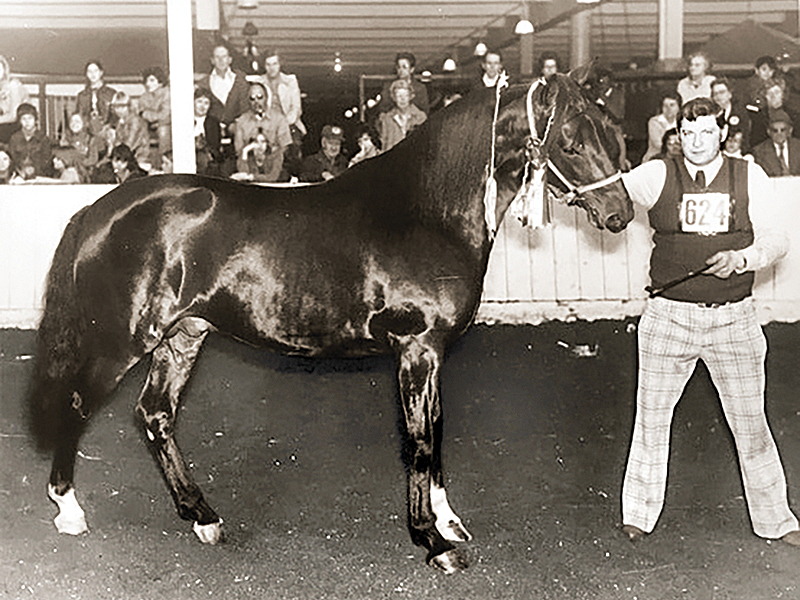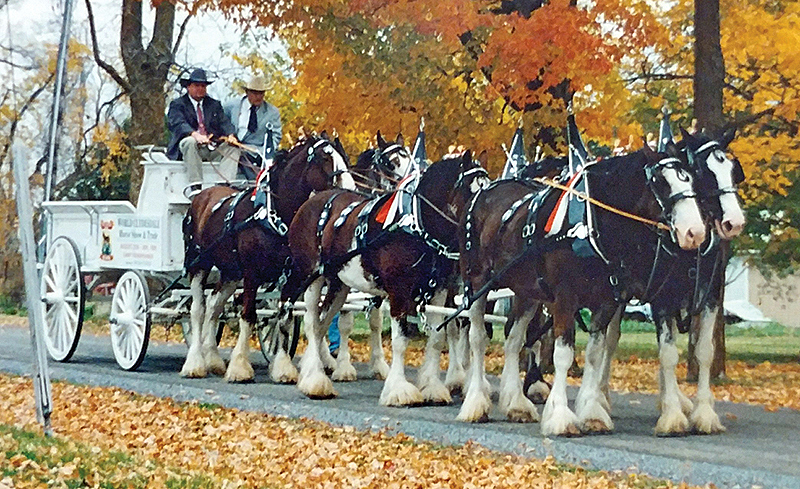Carruthers: Lover of Clydesdales, Carp
CARP – Longtime horse farmer Stan Carruthers is a man who has Carp running through his veins.
The lifelong 79-year resident has been involved in every major Carp event and project dating back to the 1952 International Plowing Match and Rural Expo held at the Carp Airport.
“That’s what really put Carp on the map,” Carruthers told West Carleton Online today (Dec. 9) in a wide-ranging interview. “There were no hotels, so everyone was billeted in village homes. People rented rooms in their homes. My dad (Gordon Carruthers, Sr.) was on the committee. He would be at two or three meetings a week. At the time of the expo, he told me I was taking the week off school. I would learn more at the expo. He was right.”
Carruthers was 12 at the time.
Carruthers has dipped his hand in many ventures and many projects in West Carleton since then. His first love has always been horses. Carruthers’ grandfather was a stallioneer in Carp who raised Percherons. But in 1922 he sold his Percheron and bought a Clydesdale stallion. It was a gamechanger for Stan.
In 1959, after some time in the dairy industry, Carruthers began the transition to horses as his primary business, purchasing a pair of Standardbred siblings named Minor Joe and Minor Helen who would become champions in the show ring as well as on the racetrack.

It wasn’t until the 1970s he made the switch to Clydesdales. In 1975, Carruthers founded the Eastern Regional Clydesdale Association and started to breed his own line of Clydesdales after purchasing eight mares and a young stallion in 1980.
One of the mares, Elmview’s Pioneer Betsy (Betsy), would become the matriarch of a long line of Clydesdale champions. Her second foal, Lady Di, became somewhat of a local celebrity in Carp, with 31 championships to her name and several local commercial appearances.
While horses were his first love, the Village of Carp comes a close second.
He says he founded the Huntley Township Historical Society back in the 1960s, but never ended up doing any of the metaphorical heavy lifting.
“Joan Johnson (Caldwell) took over and did such a good job, I didn’t even have to attend a meeting,” Carruthers said. “They’re a very competent team. So, I tried to find a place for them.”
Thus began Carruthers’ long relationship with what is currently Carp’s most controversial piece of property – the Langstaff property. The land between the Carp Fairgrounds and the West Carleton Family Health Team now earmarked for one of the largest development projects in Carp history. A piece of property Carruthers tried to get his hands on for more 50 years.
In the 1970s he thought it would be the perfect spot for the Huntley Township Historical Society. Perhaps even a museum.
“At one time I could have bought the land easy,” Carruthers said. “$2,000. The project didn’t gain traction and I let it go for a long time. If I got it, I didn’t think we’d be able to look after it and do the upkeep.”
With his affiliation with the historical society, Carruthers said he became a point person for people who wanted to donate items of historical interest.
“I’ve got two or three semi-trailers full at my Old Coach Road farm,” he said. “Enough to fill a building, that’s for sure.”
Carruthers even has the building he hoped to one-day erect on the Langstaff site. Also on his farm are the logs that made up the first log home built in the township in the 1800s.
“When May Connors married Adam Deugo, they built the home near McGee Side Road and Carp Road,” Carruthers said. “At the time (1970s) it looked like that whole area was going to get developed.”
So, along with Dale Deugo, John Payne and some others, took the home apart; placed it on two wagons attached together; and towed it to Carruthers’ farm, where the logs still lie.
“I have them off the ground, but they’re still there,” he said.
At the time, the goal was to rebuild the home on the Langstaff property.
“I couldn’t get enough people in on it,” Carruthers said.
The development along Carp Road didn’t come as fast as Carruthers expected, and it didn’t come in the form of residential units either. But the Carp Road Corridor did eventually arrive bringing light industrial and manufacturing to the Carp Road area.
“If you don’t go down the Carp Road at least once every two weeks something’s gone or something’s new,” Carruthers said.
Carruthers was a part of a different group in the aughts that also made the effort to purchase the land. He was one of the organizers, along with Wendy Deugo, of the Buy the Village Green campaign that launched in the spring of 2007. It was an effort to keep the Langstaff property as greenspace for the community to enjoy.
By summer of 2007, the group had raised a little more than $40,000 of the roughly $500,000 they felt they would need to purchase the property. The campaign ran for years. In 2016 the Buy the Village Green campaign had raised just more than $205,000 with $60,000 donated by the City of Ottawa and $60,000 donated by Waste Management.
In the end, the campaign fundraising fizzled while the land became more and more valuable. Last October, Coun. Eli El-Chantiry, a proponent of the Buy the Village Green campaign, announced donations would be returned to donors. In August 2019, the land was valued at $5.2 million. The rising price had outpaced the fundraising efforts. That property had grown in value from roughly $2,000 to $5.2 million in roughly 50 years.
“And that’s still cheap with what that land could do,” Carruthers said. “If you go by length times width times height.”
While that project proved unsuccessful, Carruthers has won for his community more often that he has lost.
He was the Carp Fair president in 1977, an honour he received two years earlier than the average fair president. Becoming president of the Carp Fair is a 12-year effort as every fair president must spend one year as chair of each of the Carp Agricultural Society’s committees before being eligible.
“It’s supposed to take 12 years, but two committee members passed during my time on the board,” Carruthers said. “The Carp Fair are still leaders in this community.”
It’s an event that has a lifelong imprint on Carruther’s childhood.
“My dad would always take his car down to the ring by the power building on Friday nights,” he said. “We’d all go and congregate there. We all knew where the car was going to be. I had an illness back then. My dad would put a blanket on the hood of the car, and I would sit on the hood because I couldn’t see the ponies from the ground because of all the people that would come by to my dad’s car.”
In the 1980s Carruthers was part of the team that would bring West Carleton’s first indoor ice pad to the community – the W. Erskine Johnston Arena.
“Your dad (Jack Davies) was a brilliant man,” Carruthers told West Carleton Online publisher Jake Davies. Jack was the fundraising chair of the project.
“He made me famous,” Carruthers said with a laugh. “He was quiet, but he was smart. He got things done. He was a shaker and quiet about it.”
In 1992, Carruthers began work on organizing the 1999 World Clydesdale Horse Show and Trade. For seven years he campaigned across Canada and the globe to put together a world-class event. He attracted support from politicians and investors with a business plan that estimated a $35,000 contribution to the Ottawa economy. To attract exhibitors and attendees, Carruthers set up booths at local fairs, and travelled to Scotland and England to advertise at highland shows.

When the show finally arrived on Aug. 25, 1999, there were almost 400 horses in attendance at the Carp fairgrounds – including six from the `Clydesdale’s birthplace, Scotland – The 1999 World Clydesdale Horse Show and Trade was, at the time, the largest Clydesdale show and competition in the world.
At 80, Carruthers is still involved in the community, maybe just not as actively as he used to be.
West Carleton Online last ran in to Carruthers at the public wake for Carp super-volunteer ‘Golf Cart’ Dave Creighton.
“That was quite the event,” he said. “Dave was one of a kind. A really nice guy. I knew his father as well.”
Carruthers is still a vendor at the Carp Farmers’ Market.
As a vendor under Carp Valley Farms, Carruthers sells organic compost, nature ash for tomato and garden insect and blight repellent.
“Horse manure compost,” Carruthers said. “I used to use it myself. I thought it was a pity, I had so much and didn’t want it to go to waste. So, when the market was starting in 1980, I wanted to help support it. The compost took off. I was selling trailer loads, and the kids loved the tractor I towed it in.”



